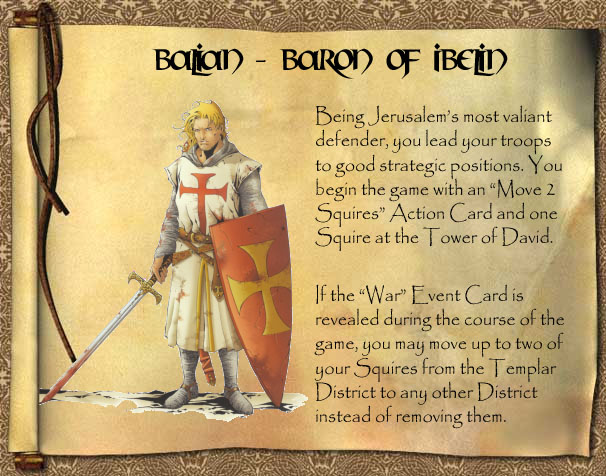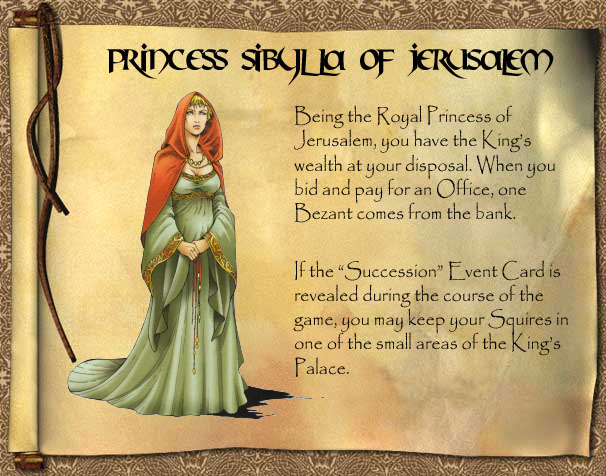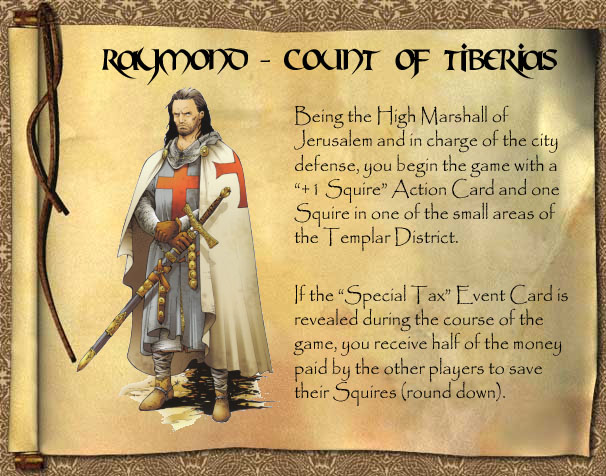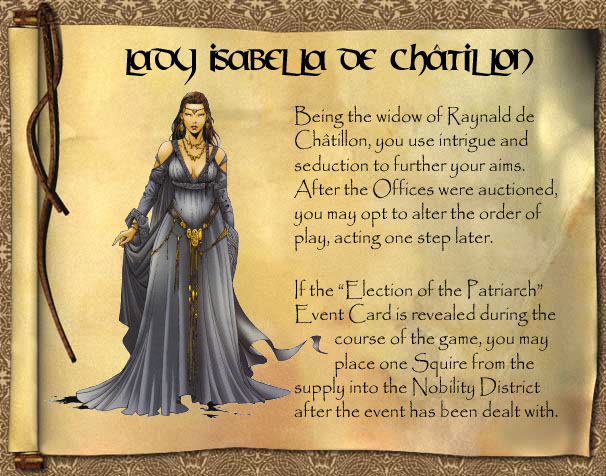|
The Italian author Michele Mura seems to have the right touch when it comes to deciding about a game's theme. Two years ago his Coloretto-adaption Easy School could score with its interesting and innovative topic, and now Michele once again has found a somewhat uncommon topic in the world of boardgames - the Crusades. Okay, there have always been some more or less Cosim-like adaptions of this theme, but in the specific area of hobbyist-family games I can only remember one lonely title in recent years. For the time being, Akkon by GOLDSIEBER has been the only representative of the Crusades-theme, but sadly both the game and its components were not able to fulfil the high hopes and expectations of hobbyist gamers. However, the situation now has changed dramatically with the release of Jerusalem, since the game finally has the strategic potential and atmosphere which many people could not find in Akkon.
 As Barons in the Kingdom of Heaven the players strive to build the highest tower of Jerusalem, and in order to reach this goal they have to accumulate Prestige which they may use to "purchase" new levels for their towers. The set of rules which accompanies the players through the game is a fusion of profession-choice and worker-placement mechanisms, and some of these components certainly can be found in one game or another. However, as you will see Michele Mura has managed to mount the different aspects into a quite harmonious whole, and by adding some nice twists and turns the game certainly offers a good level of resourcefulness. As Barons in the Kingdom of Heaven the players strive to build the highest tower of Jerusalem, and in order to reach this goal they have to accumulate Prestige which they may use to "purchase" new levels for their towers. The set of rules which accompanies the players through the game is a fusion of profession-choice and worker-placement mechanisms, and some of these components certainly can be found in one game or another. However, as you will see Michele Mura has managed to mount the different aspects into a quite harmonious whole, and by adding some nice twists and turns the game certainly offers a good level of resourcefulness.
The game has a total duration of five turns, and each turn is structured into four different phases in which the players perform their actions. Broadly speaking, the players first bid for the different available offices ("professions"), then place their squires ("workers") on the board, collect their revenues and perform building activities, and finally they have to deal with an event at the end of rounds two to four. Much is decided by the fact which kind of office a player receives, since the offices not only determine how many squires the player will receive for his personal stockpile, but in addition the offices also are used to decide about the player order and about the special ability which a player may use during the current round.

Before we look at the special ability of each office a bit more closer, let's first examine the use of the squires which can be acquired through the office cards. The squires can be placed in areas within the six major districts of Jerusalem: the King's Palace, the Templars, the Patriarchy, the Nobility, the Market and the Tower of David. Apart from the Tower of David all other districts are subdivided into three different areas, and each area has a value in Prestige, Money and/or squires which the player who has placed most squires in the particular district will receive when it comes to the collection of revenues.
 Thus, the players will use their squires to get into a majority position in one or more area in order to create revenue, and now it becomes important to notice the relation between the position in the player order and the number of available squires which are provided with each office. In effect, the number of squires a player receives decreases in proportion to a later position in the player order, and this relation is important since otherwise a late player with too many squires might spoil all actions of players with an earlier position in the player order. However, a nice twist here is the fact that a player is allowed to keep some or all of his squires for the following turn, so that nobody is forced to make a visibly futile move and some strategic options for the following turns may be pondered. Thus, it is possible to have a full hand of squires even for a player who comes late in the player order, but this means that the player will have made some costly savings in one or more earlier turns. Thus, the players will use their squires to get into a majority position in one or more area in order to create revenue, and now it becomes important to notice the relation between the position in the player order and the number of available squires which are provided with each office. In effect, the number of squires a player receives decreases in proportion to a later position in the player order, and this relation is important since otherwise a late player with too many squires might spoil all actions of players with an earlier position in the player order. However, a nice twist here is the fact that a player is allowed to keep some or all of his squires for the following turn, so that nobody is forced to make a visibly futile move and some strategic options for the following turns may be pondered. Thus, it is possible to have a full hand of squires even for a player who comes late in the player order, but this means that the player will have made some costly savings in one or more earlier turns.
 A very powerful figure available to each player is his Baron, and each turn the players are allowed to place their Barons (with an entourage of three squires) within an area of their choice. This area now is sealed off against any kinds of squire placement or movement for the rest of the turn, so that an early player actually has the chance to block at least one of his majority positions against manipulation by players coming later in the player order. A very powerful figure available to each player is his Baron, and each turn the players are allowed to place their Barons (with an entourage of three squires) within an area of their choice. This area now is sealed off against any kinds of squire placement or movement for the rest of the turn, so that an early player actually has the chance to block at least one of his majority positions against manipulation by players coming later in the player order.
Quite interestingly, the majority counts during the revenue phase do not stop at the level of areas, but instead the players also have to evaluate three districts on their grand scale. Thus, the Patriarchy, the Nobility and the Market all will provide a special privilege to the player who has placed most squires in all three areas of a district, and the available privileges range from the gaining of an Action card (at the cost of a squire) to the purchase of Prestige or the stealing of a Prestige point from another player. Thus, even a player who did not win the majority within any area of a district still has the possibility to win a district's privilege - provided he has more squires within the district than any other contestant.
 In addition to the privileges, the game offers some other features which will open the players a broader choice of special options. One source of special options are the offices, since each office allows the player who has won the office to use its unique ability. Thus, the Constable can place his Baron with a smaller entourage, the Treasurer can buy up to two additional squires, the Marshal can move up to two of his squires to other areas, and the Admiral receives an additional coin from the bank. Another special option is available to the player with most squires in the Tower of David (remember - the only district with just one area), since that player is allowed to move one of his squires from the Tower of David to any other District before the majorities are counted and revenues are collected. In addition to the privileges, the game offers some other features which will open the players a broader choice of special options. One source of special options are the offices, since each office allows the player who has won the office to use its unique ability. Thus, the Constable can place his Baron with a smaller entourage, the Treasurer can buy up to two additional squires, the Marshal can move up to two of his squires to other areas, and the Admiral receives an additional coin from the bank. Another special option is available to the player with most squires in the Tower of David (remember - the only district with just one area), since that player is allowed to move one of his squires from the Tower of David to any other District before the majorities are counted and revenues are collected.
In addition, further special options become available through the Action cards. Each player receives an Action card at the beginning of each round, based on a semi-deterministic mechanism which allows the players in player order to chose one action card from a random choice of Action cards. In addition, an additional Action card may be purchased by the player who has gained the privilege of the Patriarchy, and as indicated these cards give the players access to quite a few additional options. Thus, players may gain additional squires, money or Prestige, they may move squires or swap positions with an other player's squire.
 Jerusalem is a game of shifting majorities, and the players should try to get into majority positions on a turn by turn basis. A massive buildup in just some chosen areas does not seem to yield success, since such a buildup is too costly and makes the players options too static. In the regular course of the game squires will rarely be removed from an area, but there are instances when quite a few squires may be lost. As indicated at the beginning, an event card needs to be dealt with at the end of rounds two, three and four, and usually these event cards will lead to the removal of some or all squires from a district. Thus, the crowning of a new King will cause the loss of all squires in the Royal Palace, whereas the election of a new Patriarch has caused unrest for the Patriarchy and the Nobility so that the numbers of squires in all areas of both districts must be equalized. The special tax influences the squires on the market, and players only can save their squires there by paying money. And finally, a war with the Saracens may lead to the removal of all squires from the Templar district, but because of the size of the conflict the players who are forced to removes squires on this event are allowed to take some other players' squires with them as well. Jerusalem is a game of shifting majorities, and the players should try to get into majority positions on a turn by turn basis. A massive buildup in just some chosen areas does not seem to yield success, since such a buildup is too costly and makes the players options too static. In the regular course of the game squires will rarely be removed from an area, but there are instances when quite a few squires may be lost. As indicated at the beginning, an event card needs to be dealt with at the end of rounds two, three and four, and usually these event cards will lead to the removal of some or all squires from a district. Thus, the crowning of a new King will cause the loss of all squires in the Royal Palace, whereas the election of a new Patriarch has caused unrest for the Patriarchy and the Nobility so that the numbers of squires in all areas of both districts must be equalized. The special tax influences the squires on the market, and players only can save their squires there by paying money. And finally, a war with the Saracens may lead to the removal of all squires from the Templar district, but because of the size of the conflict the players who are forced to removes squires on this event are allowed to take some other players' squires with them as well.
 In case of the events Michele Mura has cleverly avoided the pitfall that his otherwise quite strategic game might become too arbitrary through this random element. Thus, only four different events exist, and three of them will be used in the game so that the players can speculate which events still might appear. In addition, each event is revealed at the beginning of the round, so that the players may adjust their strategy before dealing with the event at the end of the round. However, the usage of the events is only one example of the rather good balance which Michele has found for the game, since some other small twists also show that the game has been balanced and finetuned to a very high degree. Examples here can be found in the Tower construction rules which force the player who is first to build a Tower-level to pay an additional Prestige, or on the King's Gifts which are distributed before the building phase of the fifth and final round. Now the players with most squires and money left in their stockpile will receive additional prestige, and in addition each player who has an Action card left also will gain a Prestige bonus. In case of the events Michele Mura has cleverly avoided the pitfall that his otherwise quite strategic game might become too arbitrary through this random element. Thus, only four different events exist, and three of them will be used in the game so that the players can speculate which events still might appear. In addition, each event is revealed at the beginning of the round, so that the players may adjust their strategy before dealing with the event at the end of the round. However, the usage of the events is only one example of the rather good balance which Michele has found for the game, since some other small twists also show that the game has been balanced and finetuned to a very high degree. Examples here can be found in the Tower construction rules which force the player who is first to build a Tower-level to pay an additional Prestige, or on the King's Gifts which are distributed before the building phase of the fifth and final round. Now the players with most squires and money left in their stockpile will receive additional prestige, and in addition each player who has an Action card left also will gain a Prestige bonus.
Taken together, all these little acts of balancing have resulted in a well structured, multi-layered strategy game in which the players have to keep several factors in mind if they want to create a sustainable yield of Prestige. A bit of counting and some thinking time during the turns cannot be avoided, but on the other hand every placement made by the active player is interesting for everybody else so that the passive players certainly stay involved. A very good solution also was found for the danger of the game becoming too dependent on the player order, since here a counterbalance was found by giving the earlier players more squires and by introducing the Barons which can be used to seal an area off against a "hostile takeover".
Overall, Jerusalem presents itself as a very harmonious whole both on the base of its rules and its graphic design. The gameboard and the cards show some rather fitting and atmospheric artwork, and the playing pieces are represented by small but fully functional wooden components. The game leaves a rather mature impression, and due to its strongly turn-based strategic approach it can be recommended to hobbyists and occasional gamers alike.
G@mebox Special
Inofficial "Kingdom of Heaven" expansion!
Many of you will have seen the Kingdom of Heaven blockbuster movie with Orlando Bloom, but some of you might be surprised to hear that characters like Balian of Ibelin really existed as historic personalities. So, you now have the possibility to assume the role of one of these personalities in Jerusalem, and so I present to you today the first of a set of four character sheets which you might want to print out and add to your game!
Please note that the character-artwork for this character comes from the thrilling French comic series CROISADE (=crusade) by Jean Dufaux and Philippe Xavier. All rights to these graphics are reserved to the authors. No challenges to their status are intended.




|
![[Headline]](../technik/sonstige/headtran.gif)
![[Headline]](../technik/sonstige/headtran.gif)
![[IMAGE]](../bilder/jerusal1.jpg)
![[IMAGE]](../technik/box/rot/rot-6.gif)
![[IMAGE]](../technik/box/gelb/gelb-8.gif)
![[IMAGE]](../technik/box/grun/grun-6.gif)
![[IMAGE]](../technik/box/pink/pink-7.gif)
![[IMAGE]](../technik/box/blau/blau-8.gif)

